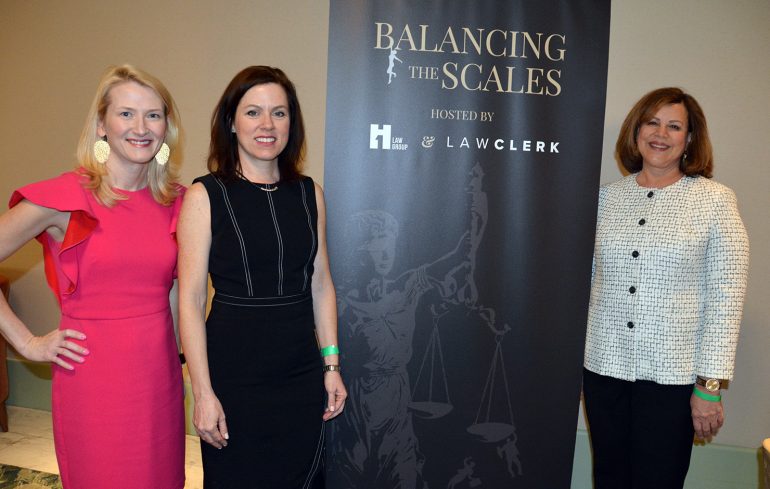Women lawyers: History lessons and takeaways from a panel around “Balancing the Scales,” the documentary about the challenges faced by women lawyers.
“I’m in my 30s and I’m a single, childless associate who has no idea if I will be on partnership track. I have considered dropping out of the law entirely as I’m not sure if I can physically do this anymore. How can I communicate my needs to my firm without sounding like a whiny millennial?”
This was one of the most poignant questions at a recent viewing of “Balancing the Scales,” a documentary about women lawyers in America. Filmmaker Sharon Rowen visited Las Vegas for a screening of the movie and led a panel discussion following it. Rowen is a litigator from Atlanta who began making documentaries like this over 20 years ago.
Panelists included Kathy England, a former president of the Nevada State Bar and partner at Gilbert & England Law Firm; Erika Pike Turner, partner at Garman Turner Gordon; Sylvia Tiscareno, general counsel for William Hill; and Moorea Katz, associate attorney at the H1 Law Group.
Responding to the young associate, Rowen noted, “Some of the old guard will never change. Just know that. There are some women who have come through the fire and are disdainful of younger women wanting it to be easier than how they had it. Things will change one person at a time. You have to individually evaluate your situation.”
England gave the young associate a two-factor test to help evaluate her situation: “The two indicators of whether you will be happy in the law are the work that you do and the people that you work with.” Another panelist encouraged the associate to directly ask for what she wants — you never know if you don’t ask. The worst that can happen is that the firm says “no” and then you are forced to be prepared to decide to leave or carry on.
Path to Disruption
“Balancing the Scales” is a portrait of the challenges facing women in the legal profession based on interviews Rowen conducted over the past 24 years. Women in the law have come a long way. But the conversation surrounding the film certainly begs the question of whether the expectations of women lawyers today are different than they were one, two or three generations ago?
Historically women lawyers have been paid less, been given less prestigious cases, and are often overlooked for promotions. NALP reports that as of 2017 women make up 19 percent of equity partners and 30.7 percent of non-equity partners. The NALP 2018 Report on Diversity in U.S. Law Firms found that 45.91 percent of associates at law firms nationally are women.
In a survey conducted this January at the American Bar Association Midyear Meeting, LAWCLERK asked attendees how progressive they think the legal industry is about gender and racial diversity. Slightly more than half (55 percent) said they believe the legal industry is behind other industries when it comes to gender and racial diversity. Thirty-two percent said the legal industry is on par and just 13 percent said it is ahead.
Rowen asked the panel whether government mandates are a solution to getting more women a seat at the table. Some panelists welcomed the idea of such mandates to disrupt the norms of the legal profession and corporate America, helping women to gain more traction. England advocated for legislation to help disrupt, saying, “I am too impatient to wait for it to happen organically. Unless we have Miracle Grow — letting it happen organically isn’t enough. Nobody asks a man ‘Can you be a good father and a good lawyer?’ We have to change that culture.”
Turner advocated for a different route of disruption, noting that when it comes to women rising up in leadership, “It comes up organically where we work with each other, support each other and then we are seen as equals and leaders rather than having a woman in power as a token if it is mandated by legislation that X number of women serve on a board.”
Tiscareno takes a proactive approach to empowering women when she is selecting outside counsel. “Because men are the majority in the C-suite level, I make it a part of my billing guidelines when I interview firms,” she said. “I look at firm websites to see who they are spotlighting. I have passed on working with firms that were all the same gender and race. Gender and inclusivity programs are important to legal departments. Diverse organizations are more profitable, period. End of story.”
From the Top Down
Retired District Court Judge Jackie Glass highlighted that Nevada recently became the first U.S. state with a majority female legislature. Glass said she strongly believes that “change has to start in our Congress — if we don’t have women in these leadership positions and mentor from the top down, we won’t see the change we desire. That’s the lesson that this is what all of us have to do — take the time to mentor and bring women up.”
The importance of mentoring young women in law firms is key. Turner discussed how mentoring young associates can help them ultimately reach equity partnership by teaching them the tools they need to build a book of business. “Some women don’t know how to ask for business or don’t have the confidence to ask for it,” she said.
England recalled that when she was advancing in her career, she was fortunate to know her rights and figured out how to push for what she wanted. She emphasized that “you have to figure out how to work with people who aren’t like you — and how to make that workplace engaging for everyone.”
Life in the Law
During the process of making the film, Rowan said that women spanning five generations told her they had decided not to have a family to further pursue their career. One woman didn’t marry until she was 82 years old as she was so fulfilled in her work that she neglected her personal life; she said later in life she looked back and felt that was probably an error.
Is it possible for a woman lawyer to juggle the competing demands of family life and a legal career? Everyone is pulling you in every direction — at home, at work, all the time.
While it is ingrained in our culture that it’s the women who step back from their careers to care for children, Rowan challenged attendees to realize it doesn’t have to be that way.
The documentary featured insights from Supreme Court Justice Ruth Bader Ginsburg, who is a wife, mother of two and grandmother of four. According to Ginsburg:
“The key is a supportive spouse. If you don’t have a spouse that believes your work is as important as theirs — then you will end up with two jobs and your spouse will have one.”
Law firm management can be, and today often is, more supportive of lawyers when it comes to their personal lives. According to Turner, “Firm leadership needs to tell their people that they will be valuable to the firm even if they have a life.”
One panelist recalled how she used to work with a man who made a big deal if she had to rearrange a meeting time to accommodate school drop-off for her son. Fast-forward a few years and that man was divorced with three school-aged kids. The conversation quickly changed so that the man was rescheduling meetings to allow time for school drop-off.
Eric Hone, founding partner of H1 Law Group, which co-sponsored the event, said, “Having women on your legal team ultimately results in better representation for your client and ultimately more profitability. Recognizing that is the first step.”
Advice for the Decades Ahead
What takeaways did the attendees — and especially the young associate with the poignant question — garner from the event?
- First and foremost, assert yourself. Set your own priorities and boundaries for the goals you want to achieve. Tell the people in your life what you need and speak up for others whose voice isn’t as strong.
- Take time to mentor — and be mentored. We need to take the lead in crafting new work environments and policies in our firms and companies by working together.
- Be bold and call out microaggressions that you witness. For example, if you attend a meeting with a client and the client assumes you are the secretary or paralegal, be sure to let them know you are one of the lawyers working diligently on their case.
- Advocate for family support issues. When it comes to family life, it’s not just women who need flexibility — men need it too. Men and women in the U.S. need more support when it comes to child-rearing and caring for elderly family members. These are bigger issues than just women in the law.
Stay in the Game
Remember, if it’s something you truly want, you can do anything you put your mind to. Don’t lose sight of the fact that as a woman in the legal profession, you have the ability to make choices about what you want to do with your career — whether it’s working in Biglaw, a boutique firm, in-house, for government or running your own solo practice.
The Las Vegas screening of “Balancing the Scales” was sponsored by H1 Law Group and LAWCLERK.
Photo courtesy of Kristin Tyler.
























